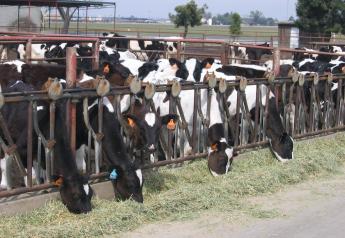Evening Report | December 15, 2023

Check our advice monitor on ProFarmer.com for updates to our marketing plan.
Your Pro Farmer newsletter is now available... Extreme temps are forecast across much of Brazil into early this week before some relief is expected, though forecast rainfall events have continually proven disappointing. Farmers are still trying to finish planting and replanting of this year’s soybean crop. The soybean delays will cause later plantings of safrinha corn – and will likely reduce second crop corn acreage more than previously expected. In Argentina, the new president unveiled his “shock” plan for the economy, which includes plans to raise grain export taxes, though that would take action by the country’s congress. Ethanol scored a potential big victory on Friday as the Biden administration announced it would use an updated version of the GREET model to determine credits for sustainable aviation fuel. On the economic front, the Fed pivoted to a dovish stance, which enticed major market moves, including a sharp drop in the U.S. dollar index, as traders now anticipate a series of interest rate cuts in 2024. In a recent report, the House Select Committee on the Chinese Communist Party suggested taking steps to crack down on Beijing. That could have major negative implications for U.S. exports to China, including agricultural goods. We cover all of these items and much more in this week’s newsletter, which you can access here.
Updated GREET model to be used for SAF credits... The Biden administration announced on Friday that it will adopt a methodology favored by the ethanol industry for claiming tax credits on sustainable aviation fuel (SAF), marking a significant victory for the U.S. corn lobby. However, the administration also plans to update this methodology by March 1, which has raised some uncertainty for corn-based ethanol producers, as it may lead to stricter requirements for SAF feedstocks. The law allocates tax credits for biofuels that can demonstrate that they cut greenhouse gas emissions by 50% or more. The forthcoming update to the GREET model will play a pivotal role in determining the eligibility of fuels for SAF credits. It is anticipated that corn-based ethanol and other renewable fuels will qualify for the credits in relation to SAF produced and used in calendar years 2023 and 2024. Following the GREET model update, focus will shift toward the Clean Fuels Credit, scheduled to take effect Jan. 1, 2025, replacing the SAF and other credits. The structure of this credit will have significant implications for the future growth of the biofuels industry, encompassing a wide range of feedstocks. Click here for more details, including reaction from ethanol/biofuels groups.
NOPA Nov. soy crush stronger than expected... Members of the National Oilseed Processors Association (NOPA) crushed 189.0 million bu. of soybeans during November, which was 3.0 million bu. higher than the average pre-report trade estimate and the second highest ever for any month. Crush topped year-ago by 5.5% and was only 0.4% below October’s all-time record. NOPA data implies the full November crush of about 199.5 million bushels.
NOPA said its November crush report included data from two facilities that weren’t previously included in a region that includes the Dakotas, Minnesota and Montana. Also, one crushing plant from another NOPA region spanning Indiana, Kentucky, Ohio, Michigan and Pennsylvania, was no longer reporting data.
Soyoil stocks at the end of November totaled 1.214 billion lbs., up 10.4% from October and the first increase in seven months. But soyoil stocks dropped 416 million lbs. (25.5%) from year-ago.
Port of Los Angeles chief warns against 10% import tariff... The chief of the nation’s largest port, the Port of Los Angeles Executive Director Gene Seroka, in an interview on Bloomberg TV, voiced concerns about the potential impact of a 10% tariff on all U.S. imports, as proposed by former President Donald Trump. Such a tariff, Seroka warns, would have devastating consequences for an economy heavily reliant on trade. Los Angeles, in conjunction with neighboring Long Beach, accounts for nearly 40% of the nation’s imports, making it particularly vulnerable to the effects of such a tariff. Trump had suggested this 10% tax on all imports into the U.S. from all countries in August, describing it as a means to bolster the economy.
However, the White House viewed this idea as a sweeping tax on the middle class, and economists like Nobel Prize winner Paul Krugman expressed concerns about the potential repercussions. While the direct impact on GDP might not be substantial, such a move could undermine the rules-based global trading system and trigger retaliatory measures from U.S. trading partners. It could also exert upward pressure on consumer prices at a time when inflation is slowing, and the Federal Reserve is considering ending interest rate hikes.
Despite these concerns, Seroka offered a cautiously optimistic outlook for the economy and trade in 2024. The Port of Los Angeles experienced a 19% year-on-year increase in container imports and exports last month, signaling positive momentum. Seroka anticipates a more normal flow of cargo as companies replenish their inventories. He also noted that exports through Los Angeles have been on the rise, particularly driven by agricultural products and finished manufactured goods bound for Asia and other destinations.
While trade with China has declined slightly, it hasn’t plummeted dramatically. Last year, 57% of goods passing through the Los Angeles port either originated from or were destined for China. This year, that figure stands at approximately 53%, indicating a shift but not a drastic drop in trade volume with China.
Top Fed official says talk of March interest rate cut is ‘premature’... New York Federal Reserve President John Williams, an ally of Fed Chair Jerome Powell, says rate cuts are not currently a topic of discussion for the U.S. central bank. He emphasized the focus is on assessing whether monetary policy is sufficiently restrictive to bring inflation back down to the 2% target.
Stabenow blocks bill to allow whole milk in school lunches... Senate Ag Committee Chair Debbie Stabenow (D-Mich.) prevented Sen. Roger Marshall (R-Kan.) from passing the Whole Milk for Healthy Kids Act by unanimous consent in the Senate. This legislation, already approved by the House, aims to allow whole milk back into the school lunch program, reversing a ban that has been in place for over a decade. Stabenow’s opposition to the measure is based on her belief that it goes against the Dietary Guidelines for Americans and had signaled her intent to block the bill before it was brought to the Senate floor. Stabenow emphasized the importance of maintaining school meal standards that are rooted in dietary science, rather than promoting specific food products. She suggested those advocating for the inclusion of whole milk in school meals should participate in USDA’s review of the school meal program rather than having Congress intervene in the process.






